Plot
The story begins with Sofie (Laura Buhl) being told by her single mother, Tove (Ann Eleonora Jørgensen), that they have to move to Singapore by the end of December for her job, and for her new boss, Mr. Tong. They have to stay with Ragnhild (Vigga Bro), Tove's mother and Sofie's grandmother, until that time because Tove has already sold their apartment. Sofie is gloomy because she does not want to move to Singapore, as she has had to constantly move around the world for Tove's job as an efficiency expert.
When they reach Ragnhild's house on a hill called "Loki's Hill", they find that the loft is being rented out to a woodsman named Asbjørn (Troels Lyby), who is also a single parent, and has two children named Jonas (Lukas Thorsteinsson) and Emma (Clara Bahamondes). Sofie and Jonas become close friends very quickly, but Tove and Asbjørn have a lot of tension and animosity between each other because their personalities are opposites. Tove has a great love of technology and business, while Asbjørn values nature and days of honest labour outdoors. While they often quarrel over the differences in their ideologies, they also quarrel over petty things; for example which side of the room they think the basket of chopped wood should be kept on (this, in particular, becomes a running gag throughout the series). Over the course of the series, the attraction between them increases and they gradually fall in love.
Sofie goes out exploring Loki's Hill, and finds an old dolmen surrounded by a ring of megaliths on the crown of the hill. She accidentally kicks a small rock into the dolmen, and afterwards she hears strange bell-like metallic noises coming from within. Startled, she runs back to Ragnhild's house. Over dinner that night, Sofie asks her grandmother why her home address is called "Loki's Hill". Ragnhild tells the children that it is because the legends say the old hill near the house is the place where the Norse god Loki is still chained. That night, before she goes to bed, Sofie looks out a window and sees a yellow glow emanating from the top of Loki's Hill.
Jonas and Emma go to school the next day, but Sofie feigns illness so she can stay home and explore some more. She succeeds in tricking Tove, who allows her to stay home. Then, Sofie goes back to the dolmen she found and crawls in. Inside, she sees a large stone snake decorating the wall, and in the middle of the cavern, she sees a man with long hair and beard chained (by both of his arms and by his neck), on his knees, and apparently sleeping (his eyes are closed and he is snoring). When Sofie tries to move the man's hair so she can see his face, he wakes up, and is surprised to see a person. He introduces himself as the Norse god Loki, and implores Sofie to unchain him. Sofie is frightened and runs back home, while Loki calls after her to not be afraid and to come back.
When Jonas comes home from school, he notices that Sofie has mud on her clothes, and knows that she was outside playing instead of healing indoors. The next day, Sofie goes back to the dolmen to see Loki again. Loki offers to give her a rune stick, which would have the power to cast a spell. Sofie wants a spell to heal Emma's sick rabbit. Loki makes a show of not being able to carve the runes into the stick, as his arms are chained. Sofie unchains one of Loki's arms, and he makes the rune stick for her. The spell works, and the rabbit is healed. Jonas finds the rune stick in the rabbit's box, and he is curious about where Sofie has been going. He confronts her about this, and she concedes, telling him about the dolmen and Loki. They gather together some goods to bring to Loki, including a razor, some men's underwear (both belonging to Asbjørn), and some scissors.
The following day, Sofie takes Jonas to see Loki while bringing him the goods they had gathered, and Jonas helps Loki shave his face. Sofie does not want to unchain either of Loki's two remaining bonds, but Jonas is tempted by the magical spells Loki has to offer, so he returns to the dolmen later, without Sofie. Then, Jonas has Loki make a rune stick for him that would make his father change his mind about technology and get a television, in exchange for Jonas unchaining Loki's other arm. Loki's spell works, and Asbjørn promptly purchases a large television, and Jonas tells Sofie what he has done.
Sofie soon realizes that she could have Loki make a spell which would keep her from having to move to Singapore. Loki says this would be a simple spell for him to make, but she would have to unchain his final bond. Sofie begins to, but decides against it and runs back to the house, again with Loki calling after her to come back. She talks to Jonas about it, and Jonas is disappointed that she did not get the spell, because he has become very close to Sofie. He again goes to the dolmen without Sofie knowing, and tells Loki that he is willing to unchain him for the rune stick he had made for Sofie, and proceeds to do so. However, Tove shows no sign of staying in Denmark, and even prints out a picture of the Singaporean hotel in which they will be staying, and shows it to Sofie, pointing out their exact room. Sofie is upset with Jonas for having been tricked so easily.
The two return to the dolmen to see if Loki is still there, but he is not. While they stand there, a heavy snow begins to fall. Back at the house, Ragnhild comments that the snow is so heavy that it is almost like Fimbulwinter. She tells the children that Fimbulwinter is the harbinger of Ragnarok, which she describes as the battle in which all humans, gods, and giants will die, but she adds, it won't come until Loki has been freed from his chains. This makes Jonas and Sofie worried, because they know Loki has truly been freed.
Sofie and Jonas then set up a hideout in Loki's old dolmen where they can make plans on how to stop Loki, and effectively stop Ragnarok. They then discover a tunnel behind the stone snake that leads to Asgard. They ask the gods about Loki, but none of them want to talk about him. Jonas and Sofie do not tell them that Loki has escaped because they are afraid. They decide that the one friendly place where Loki must be hiding is in Hel, the land of the goddess Hel. They then travel there, and meet Hel and Balder, the latter telling them that Loki is indeed hiding out there.
Soon after, however, Loki travels to Utgard to corroborate Ragnarok plans with the giant Thrym. The gods refuse to tell them how to get there (saying it is no place for children), but Jonas and Sofie manage to trick Heimdall into telling them how to get to Utgard. Jonas and Sofie then disguise as scullery maids to spy on Loki and Thrym. They learn that Loki still needs one last thing before he can start Ragnarok. The gods tell them that Loki cannot start Ragnarok without the Fenris Wolf, and they decide this must be it. They figure out that their grandmother's dog, Snifer, is actually Fenris (and that "Snifer" is actually just an anagram of Fenris), so they rush back to the house to get Snifer. Meanwhile, Loki gets into the house first by disguising as a delivery boy, and he takes Snifer before the children can get home.
Back in Utgard, Thrym decides that he doesn't need Loki anymore, since he has the Fenris wolf, and the Fimbulwinter is well underway. He and Loki had originally agreed that, after the battle, Loki would rule Asgard and Thrym would rule Jotunheim. Thrym now says, however, that he intends to rule both Asgard and Jotunheim himself. Loki decides that it is not worth it to fight his family anymore, begins to regret having started Ragnarok, and flees to Midgard.
Returning to Midgard, Loki meets Sofie and Jonas, as they have been spending a lot of time in his dolmen. At first they are angry with him, but after Loki explains his plight they decide to work together to stop Ragnarok. Jonas and Sofie find out that if any part of the prophecy of Ragnarok is broken or contradicted, the entire prophecy is rendered bunk. Otherwise, so long as all the conditions are met, it will be unstoppable. They decide that they should get at least one of the gods to forgive Loki, because one of the conditions in the prophecy is that none of the gods forgive him.
They disguise Loki as Sofie's grandmother, and take him to Asgard to seek forgiveness. All of the gods refuse to forgive Loki. Odin easily recognizes Loki through his disguise, and apprehends him. Jonas and Sofie return to Midgard. They are about to give up hope, when they remember that one of the gods was not in Asgard: Balder. They go back to Hel, and this time Emma sees them and follows them. Since time is running short, they do not take her back home. In Hel, Balder says that he would gladly forgive Loki.
Hel says she will only let Balder go to Asgard to forgive Loki if they leave Emma behind as insurance that Balder will come back. They agree, and Balder forgives Loki in Asgard, meanwhile Emma stays behind playing games with Hel. This breaks the prophecy, and a different future is then possible. Thus, Ragnarok is avoided before any of the gods are harmed. Odin, after seeing his beloved son Balder forgive Loki, also forgives Loki.
The gods then celebrate Yule late, because Fimbulwinter pushed the winter solstice back. Odin is sad because he had seen his son Balder again after many years, but he quickly had to leave. But, since Hel was invited to the Yule celebrations this year (previously the other gods had excluded her because they considered her to be strange), she allowed Balder to come along with her, and Odin rejoices in seeing his son again. Jonas and Sofie give the gods various gifts: Heimdall gets polish for Gjallarhorn, Sif gets a mirror, Idun gets hair spray, Freya gets Sofie's charm bracelet, and Loki gets an electric razor. Loki asks why Sofie seems sad, and she explains that she still has to leave for Singapore.
Back at Ragnhild's house, Sofie does not enjoy her Christmas dinner, because she is constantly thinking about the move to Singapore. They hear the taxicab arrive in the middle of dinner, so Sofie and Tove go outside, but the cabby is actually Loki in disguise. Loki decided that owed Sofie a favour, so he has Tove quit her job and they do not move to Singapore. Jonas and Sofie are happy that they can continue to be friends, and Asbjørn is happy that Tove will stay with him.

Loki is a god in Norse mythology. He is the son of Fárbauti and Laufey, and the brother of Helblindi and Býleistr. Loki is married to the goddess Sigyn and they have two sons, Narfi or Nari and Váli. By the jötunn Angrboða, Loki is the father of Hel, the wolf Fenrir and the world serpent Jörmungandr. In the form of a mare, Loki was impregnated by the stallion Svaðilfari and gave birth to the eight-legged horse Sleipnir.

Valhalla is a Danish comic series, which offers a comedic view of the gods of Norse mythology. Originally commissioned for and published by Interpresse, it has been published by Carlsen Comics since 1978. In 1986, Valhalla was adapted into an animated feature film the studio A Film. On October 10, 2019, a more serious and dark live action adaptation was released.
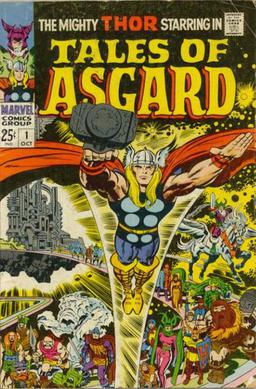
Asgard is a fictional realm and its capital city appearing in American comic books published by Marvel Comics. Created by Stan Lee, Larry Lieber and Jack Kirby, the realm first appeared in Journey into Mystery #85. Based on the realm of the same name from Germanic mythology, Asgard is home to the Asgardians and other beings adapted from Norse mythology. It features prominently in stories that follow the Marvel Comics superhero Thor.

Odin Borson, the All-Father is a fictional character appearing in American comic books published by Marvel Comics. First mentioned in Journey into Mystery #85, the character first appears in Journey into Mystery #86, and was adapted from the Odin of Norse mythology by Stan Lee and Jack Kirby. The character is depicted as the father of Thor and, traditionally, as the king of Asgard.

Ragnarok is a manhwa created by Lee Myung-jin and published by Daiwon C.I. in South Korea from 1998 to 2001. There are currently 10 volumes in circulation, which were republished in English in North America by Tokyopop from May 21, 2002, to April 6, 2004.
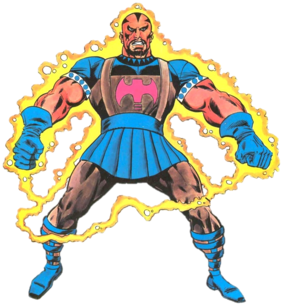
The Executioner is the name of different fictional characters appearing in American comic books published by Marvel Comics.

Loki Laufeyson is a character appearing in American comic books published by Marvel Comics. Created by writer Stan Lee, scripter Larry Lieber, and penciller Jack Kirby, he is based on the Norse mythological deity of the same name. Although a version of Loki debuted in Venus #6, his characterization as the adoptive brother and nemesis of the superhero Thor was introduced with the version that debuted in Journey into Mystery #85, which has persisted to the modern age.

Heimdall is a fictional character appearing in American comic books published by Marvel Comics. The character is based on the Norse deity Heimdall. Heimdall is described as all-seeing and all-hearing and is the sole protector of the Bifröst in Asgard.
The Norse mythology, preserved ancient Icelandic texts such as the Poetic Edda, the Prose Edda, and other lays and sagas, was little known outside Scandinavia until the 19th century. With the widespread publication of Norse myths and legends at this time, references to the Norse gods and heroes spread into European literary culture, especially in Scandinavia, Germany, and Britain. In the later 20th century, references to Norse mythology became common in science fiction and fantasy literature, role-playing games, and eventually other cultural products such as Japanese animation. Storytelling was an important aspect of Norse mythology and centuries later, with the rediscovery of the myth, Norse mythology once again relies on the impacts of storytelling to spread its agenda.

Surtur is a fictional character appearing in American comic books published by Marvel Comics, commonly as an enemy of Thor. Based on the fire giant Surtr from Norse mythology, he was adapted by writer Stan Lee and artist Jack Kirby, and first appeared in Journey into Mystery #97. The character was once described as one of "The Ten Most Heinous Enemies of the Mighty Thor".
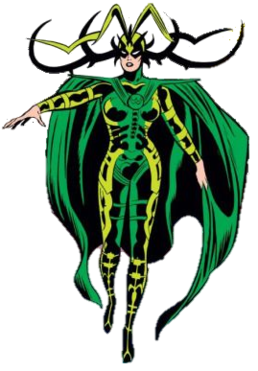
Hela is a fictional character appearing in American comic books published by Marvel Comics. She is based on the goddess Hel from Norse mythology, and was first adapted by Stan Lee and Jack Kirby in Journey into Mystery #102. Hela is the Asgardian Goddess of Death who serves as the ruler of Hel and Niflheim. The character is usually depicted as an adversary of the superhero Thor.
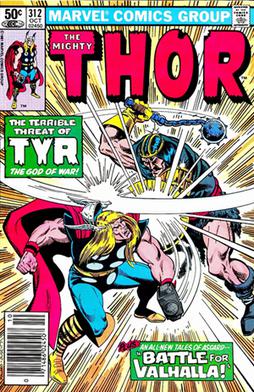
Tyr is a fictional character, an Asgardian god appearing in American comic books published by Marvel Comics. The character is based on the Norse god of the same name. Along with Thor and Balder, he is one of Odin's biological sons.
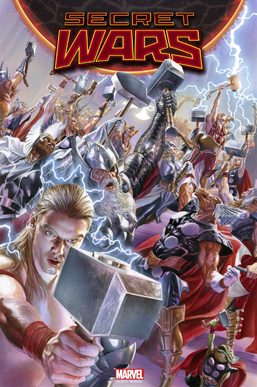
Thor was created by Stan Lee, Larry Lieber and Jack Kirby. There had been multiple alternative versions of Thor, both in the main continuity as well as alternate stories. The character is based on the Norse deity Thor.

Arise: From Ginnungagap to Ragnarök – The History of the Vikings Volume III is a concept album by German heavy metal band Rebellion and the last part of the Viking History trilogy. This album tells the history of the Norse Gods and Norse religion.
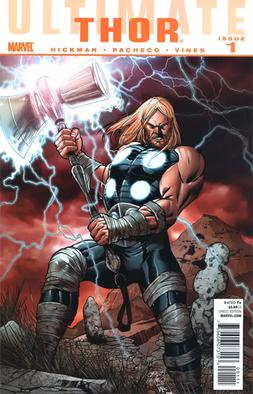
Ultimate Comics: Thor is a comic book limited series published by Marvel Comics that debuted in October 2010. The series takes place in the alternative Ultimate Marvel universe. Based on the Ultimate Comics version of the Norse god Thor, the series was written by Jonathan Hickman with art by Carlos Pacheco. In an interview, Hickman said that the series would be a prequel to Mark Millar's limited series The Ultimates,
"It starts eons ago, in the long ago time of mystic Asgard, and, yes, takes us up to the start of [the first issue of] ULTIMATES. If I do my job well, it should jive [sic] with all the Ultimate Thor things we've seen up to this point."

Magnus Chase and the Gods of Asgard is a trilogy of fantasy novels based on Norse mythology written by American author Rick Riordan and published by Disney-Hyperion. It is set in the same universe as the Camp Half-Blood Chronicles and The Kane Chronicles series. The first book, The Sword of Summer, was released on October 6, 2015. The second book, The Hammer of Thor, was released on October 4, 2016. The Ship of the Dead, the third book, was released on October 3, 2017.

The Ship of the Dead is a young-adult fantasy novel based on Norse mythology written by American author Rick Riordan. It is the third and final novel in the Magnus Chase and the Gods of Asgard trilogy, preceded by The Hammer of Thor. It was released on October 3, 2017, by Disney-Hyperion, an imprint of Disney Book Group. The novel is narrated in the first-person view by Magnus Chase, 16-year-old demigod and homeless orphan. He and his crew sail to the farthest borders of Jotunheim and Niflheim in pursuit of Asgard's greatest threat.

Norse Mythology is a 2017 book by Neil Gaiman, which retells several stories from Norse mythology. In the introduction, Gaiman describes where his fondness for the source material comes from. The book received positive reviews from critics.
















